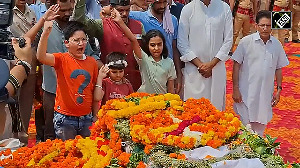If eight states could join the VAT system much after the rollout date and after seeing how it works, why can't the same apply to states opposed to the farm laws, asks A K Bhattacharya.

Many theories on how the farmers' agitation went astray on Republic Day are doing the rounds.
With clear signs of the two-month long agitation by farmers losing momentum without a road map on the direction of its future course, a post-mortem examination is also going on to find out why and how the situation came to such a pass as it has now.
One of the popular theories gaining salience in many debates in the media and elsewhere suggests that the farmers made a tactical mistake by not accepting the government offer of keeping in abeyance the three new agricultural laws for 18 months.
The aggrieved farmers could have used these 18 months to discuss with the Centre the necessary changes in the laws and also take advantage of this period to prepare for the new regime.
What the farmers failed to recognise was that the government's offer was not like what the Supreme Court had earlier suggested.
The apex court's decision to set up a committee of experts, which would discuss the laws with the farmers and make suggestions for changes if any, cut no ice with the farmers.
There was no loss of popular sympathy for the farmers, even after many of them showed no trust in the expert committee.
But the popular view of the protests changed when the farmers insisted that they would end their agitation only when the government repealed the laws and made a commitment on continuing the minimum support price scheme for agricultural commodities.
This was largely because the farmers had taken an extreme position without remaining flexible and open to give and take.
In stock market parlance, it is being said, the farmers should have booked profits by accepting the government offer to keep the laws in abeyance for one-and-a-half years, declared victory and moved on with further talks, which could be easily extended beyond the stipulated 18 months.
Instead, they spurned the government offer and insisted on taking out a rally on tractors on Republic Day.
It was at this point in time that the government seemed to have made a tactical shift in its strategy that has now given it a slightly upper hand in its confrontation with the farmers.
It told the agitators that its offer of keeping the laws in abeyance was final and nothing more could be expected.
Simultaneously, it allowed the rally by farmers on Republic Day.
From that point onwards, the farmers have been losing ground.
It is difficult to ensure that all the participating members in any such rally follow the earmarked route.
The dangers of unruly elements infiltrating such a rally were also very real.
But by now, the farmers had painted themselves into a corner.
The demands made by them were already being questioned in many circles and now even the manner in which those demands were being raised came under attack.
On top of that, the events on the Republic Day neutralised the many gains they had made earlier by running a largely peaceful agitation on the outskirts of Delhi for more than two months.
The government, on the other hand, gained an upper hand for the first time since the agitation began.
This was a role reversal that few had anticipated.
The agitating farmers, who had enjoyed the sympathies of many observers, had suddenly lost them.
Forgotten were the many acts of impropriety committed by the government in the manner in which the laws were rushed without any proper debate within or outside Parliament.
What stood out was the way the farmers stormed the Red Fort and indulged in violence in violation of the promises of a peaceful rally they had made to the police.
What should be the way forward? The onus lies with the Union government.
It must make the first move by renewing its earlier offer and show its openness to discuss the issues.
That would be a statesman-like response from the Union government.
Indeed, this is an opportunity.
No government can ignore the reality of the farming community's electoral power.
In the past few years, the Modi government has raised the minimum support prices and introduced a new scheme for income transfer to farmers.
This was the first time that it had incurred the wrath of a large section of farmers, particularly in the northern states.
It must make amends.
Farmers too should respond to such gestures and not repeat past mistakes of adopting an extreme position.
President Ram Nath Kovind, in his address on the eve of the Republic Day, had conceded that there could be misapprehensions about reforms in agricultural and labour laws during the initial stages of their implementation, but the government remained 'singularly devoted to farmers' welfare.
The Budget session of Parliament is an opportunity for the government.
It should use the forum of Parliament to discuss the farm laws and end the stalemate over them.
If necessary, the government should even offer not to implement these laws in the states whose farmers are opposed to them.
Let the Punjab farmers and the state government of Punjab evaluate how the new laws impact the agricultural sector in other states, which are ready to implement them.
If after a couple of years, the Punjab farmers see merit in these laws, they could volunteer to accept them.

The United Progressive Alliance government had rolled out the state value-added tax (VAT) system from April 2005.
But at the time of its launch, as many as eight states had stayed out of the new taxation system that had replaced the state sales taxes.
The reasons for their not joining the new system ranged from a lack of adequate preparation to reservations about the new value-added tax regime.
None of those states was forced to join the new taxation system.
Yet, all those states which had stayed out of the new regime joined the VAT system a few years later.
With the three farm laws in question, the National Democratic Alliance government could try out something similar.
Feature Presentation: Aslam Hunani/Rediff.com












